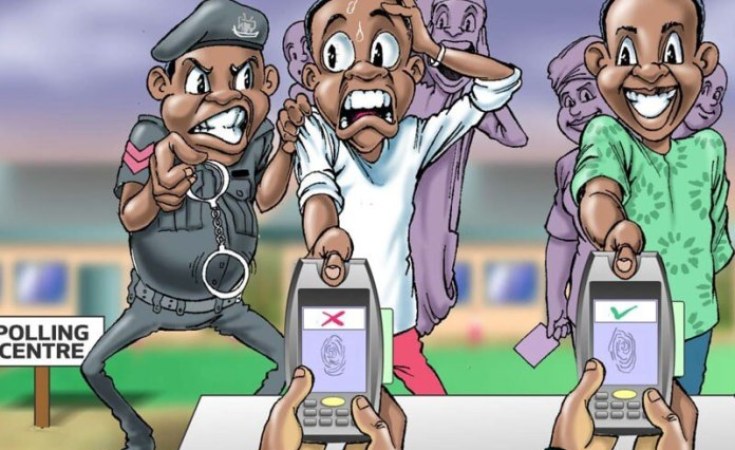The next general election in Nigeria to elect the President, Vice-President, Senators and members of the federal House of Representatives is scheduled for February 23, 2023. Already, violent rhetoric is escalating, threatening both the safety of elections and wider national conflict.
Violence leading to deaths has marred previous elections in Nigeria, but it shouldn't anymore. We are both medical doctors; Nsofor is a public health physician while Tijani is a clinician. We are advocating for a public health approach to organising and conducting elections in Nigeria in order to keep people safe.
Since 1999 when Nigeria returned to democracy after 34 years of military dictatorships, elections have been associated with violence. Reports by the U.S. Council on Foreign Relations shows that 100 people were killed in election-related violence in 2003, 300 people in 2007 and 800 people in 2011.
Violence during elections in Nigeria also leads to injury and displacement. In 2008, for instance, in the north central Nigerian city of Jos, violence during local government elections led to more than 300 people injured, 11,450 displaced and 60 deaths, according to reports by Nigerian Red Cross Society.
There is no significant improvement over the years because recent elections have not been different from previous ones in terms of violence. In the 2019 general elections, an estimated 626 people were killed spanning over 6 months of electioneering campaigns before the general election as reported by Nigeria Civil Society Situation Room.
By the time the elections ended, at least 39 people were killed, based on reports by the New York Times. One of the casualties of the 2019 general election was 19-years-old university student Daniel Usman. Usman had used his social media handle to preach against election violence 15 hours before the day of voting, but unfortunately, he was killed by political thugs for simply going to exercise his franchise.
Nigerian hospitals especially the Accident and Emergency units are usually inundated with inflows of those injured or the dead. Dr. Mike works in the surgery department at one of the tertiary hospitals in north central Nigeria. From his account on election days; he is either taking victims to theater for surgeries or he is resuscitating those who are critically injured.
Nigerians should feel safe going to cast their votes for the candidates of their choice and go back home without dying in the process. These are three ways to ensure forthcoming elections are safe for public health, focusing on prevention, protection and promotion of health.
Preventative public health advisories should be shared by the government before elections take place. As local government elections will take place in some states before the 2023 elections, part of preventative advisory should include observing COVID-19 protocols at polling booths.
The Nigeria Centre for Disease Control guidelines on conduct of elections during a COVID-19 outbreak should be implemented by the Independent National Electoral Commission (INEC) and ensure that it leads to public safety. Other preventative advisory efforts include working with agencies such as the Nigerian Red Cross and training INEC staff on provision of first aid during elections.
Protecting voters from injuries during elections should be a priority. Election-related violence in the past shows that thugs and other miscreants are the perpetrators. INEC must keep working with security agencies to prevent violence. When police and military officers provide security at polling booths, the likelihood of violence is reduced significantly.
In addition, polling booths should have standby ambulances to convey the injured and those that may fall ill. The availability of first aid and ambulances to convey victims to hospitals would ensure that fatalities are reduced. Government should invest in awareness campaigns on attitudinal change towards elections both for the political class and the general populace. Such messaging should be deployed via multiple platforms such as radio, TV, newspapers, town criers and social media.
The World Health Organization defines health promotion as the process of enabling people to increase control over, and to improve, their health. Preventative and protection initiatives are integral components of health promotion.
However, sometimes violence is not entirely eliminated with voters at polling booths. A way to promote health is through the adoption of technologies that would remove the need for voters to leave their homes and go to polling booths to cast their votes. Adopting an electronic voting system will enable Nigerians to vote remotely without putting them in harm's way.
To be sure, these public health measures would not automatically end all forms of election violence. However, prioritizing them are baby steps in the journey to ensuring violence-free elections in Nigeria.
Nigerians should not die or maimed because they want to exercise civic responsibility.
Dr. Ifeanyi M. Nsofor is a Senior New Voices Fellow at the Aspen Institute, a Senior Atlantic Fellow for Health Equity at George Washington University and an Innovation Fellow at PandemicTech. He is the Director of Policy and Advocacy at Nigeria Health Watch. You can follow him on Twitter @ekemma. Dr Tijani Salami is a Principal Medical Officer at the Federal University of Technology Minna. He is a 2021 New Voices Fellow at the Aspen Institute. You can follow him on Twitter @DrSalamiTijani1.
AllAfrica's reporting on peacebuilding in Africa is supported by the Carnegie Corporation of New York, "investing in knowledge that inspires informed action in democracy, education and international peace".


